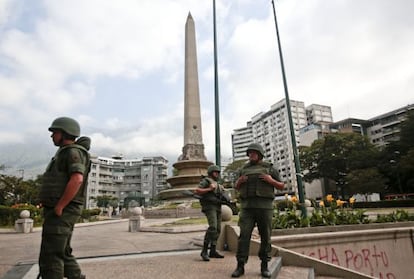Venezuelan military kicks protestors out of symbolic square
‘TalCual’ publisher accuses National Assembly speaker of abusing his position

More than 1,000 Venezuelan National Guard troops on Tuesday continued patrolling a major square in Caracas from which anti-government demonstrators had been dislodged the day before on President Nicolás Maduro’s orders.
As political and social tensions continued to rise throughout the country, the opposition beefed up its protests with spontaneous demonstrations at traffic lights around the Plaza Altamira.
“I am going to give them two hours to go home,” Maduro said on Saturday, referring to the opposition supporters who have been using the square in the affluent Chacao district as their rallying point in the city. “If this isn’t the case, then I will personally go and free Altamira.”
Plaza Altamira, which is bounded by three major thoroughfares and has an obelisk fountain in the center, has been the bulwark of the opposition since 2002 when supporters launched their anti-government protests against then-President Hugo Chávez.
By Monday morning, the area around Plaza Altamira and several surrounding neighborhoods was being patrolled by the military and police. But the protestors did not go quietly. Security forces fired tear gas and rubber bullets at small pockets of die-hard demonstrators who were adamant about remaining on Sunday night. At least 30 people were arrested.
Plaza Altamira has been the bulwark of the opposition since 2002
Soldiers on Monday continued to stop bystanders and ask for identification.
In Prados del Este, a wealthy neighborhood in southeast Caracas, police raided homes and local businesses and, according to official reports, found homemade bombs, Molotov cocktails and material for setting up road barricades.
“We have defeated the protestors,” said Interior Minister Miguel Rodríguez Torres. On Monday morning, various government officials, including the transportation and communications minister, inspected the empty plaza.
The official death toll from the past 34 days of protests stands at 29, according to government figures. More than 300 people have been injured in the clashes and around 1,600 people have been arrested.
At the same time tensions between the opposition media and the government continue to rise. On Monday, Teodoro Petkoff, a former Marxist guerrilla and Maduro critic who publishes the liberal daily TalCual, filed a formal complaint against the powerful speaker of the National Assembly, Diosdado Cabello, for alleged political persecution.
Earlier this month, Cabello filed a defamation complaint against TalCual and a columnist, claiming he was misquoted in story about a high-profile murder case.
Petkoff asked the Attorney General’s Office to open an inquiry against Cabello, but observers believe that his complaint will fall on deaf ears because prosecutors have sided with the government in most of the cases that have been filed.
Petkoff has also accused Cabello – seen as the second-most powerful politician in Venezuela – of forging public documents and abuse of power.
Tu suscripción se está usando en otro dispositivo
¿Quieres añadir otro usuario a tu suscripción?
Si continúas leyendo en este dispositivo, no se podrá leer en el otro.
FlechaTu suscripción se está usando en otro dispositivo y solo puedes acceder a EL PAÍS desde un dispositivo a la vez.
Si quieres compartir tu cuenta, cambia tu suscripción a la modalidad Premium, así podrás añadir otro usuario. Cada uno accederá con su propia cuenta de email, lo que os permitirá personalizar vuestra experiencia en EL PAÍS.
En el caso de no saber quién está usando tu cuenta, te recomendamos cambiar tu contraseña aquí.
Si decides continuar compartiendo tu cuenta, este mensaje se mostrará en tu dispositivo y en el de la otra persona que está usando tu cuenta de forma indefinida, afectando a tu experiencia de lectura. Puedes consultar aquí los términos y condiciones de la suscripción digital.








































